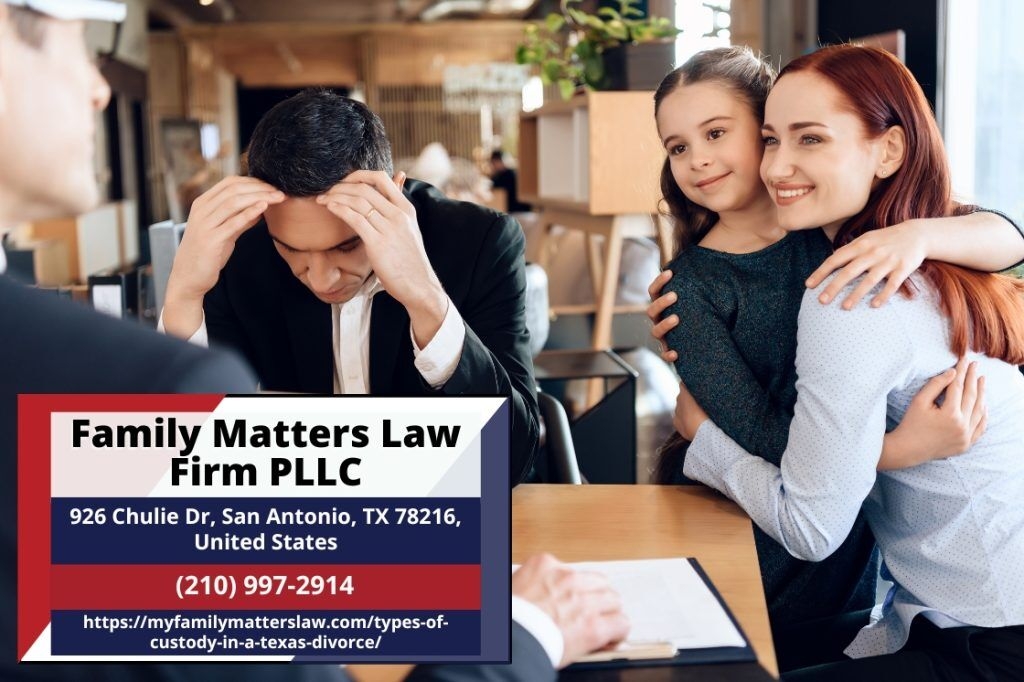Texas child custody attorney Linda Leeser (https://myfamilymatterslaw.com/types-of-custody-in-a-texas-divorce/) of Family Matters Law Firm PLLC is shedding light on how custody arrangements are structured during divorce in Texas. With child custody decisions being one of the most challenging aspects of separation, Leeser offers parents clarity on the legal terms, responsibilities, and possible outcomes involved in these decisions.
Texas law refers to child custody as “conservatorship,” and it includes several types that define the role of each parent in the child’s life post-divorce. Texas child custody attorney Linda Leeser emphasizes that understanding these options helps parents focus on the well-being of their children. Through Family Matters Law Firm PLLC, Leeser works with families to ensure they have the tools to create custody plans that reflect their specific needs and circumstances.
In Texas, joint or sole conservatorships can be ordered depending on the child’s best interests. Texas child custody attorney Linda Leeser points out that without a formal court order, either parent may have unrestricted rights to the child, which can lead to conflicts and instability. Establishing a conservatorship order outlines each parent’s duties and rights, from educational decisions to physical custody, and makes these obligations enforceable under Texas law.
One of the most common custody arrangements is Joint Managing Conservatorship (JMC), where both parents share decision-making responsibilities. This structure allows both parents to participate in key areas of the child’s life—like education, medical care, and counseling—though the court often designates one parent as the custodial parent. In most cases, the custodial parent is given the exclusive right to determine the child’s primary residence, a decision that promotes a stable and consistent environment for the child.
According to Linda Leeser, “Joint Managing Conservatorship does not necessarily mean equal parenting time, but it ensures both parents stay involved in the important decisions that shape their child’s life.” Texas courts assess each family’s dynamics, such as parental cooperation, the child’s bond with each parent, and geographic proximity when deciding whether a JMC is appropriate.
In contrast, Sole Managing Conservatorship (SMC) is typically granted when one parent is found to be unfit or when joint custody would not be in the child’s best interest. This legal structure gives one parent the exclusive authority to make decisions regarding the child’s residence, medical care, education, and legal matters. Linda Leeser notes that this approach is often used in cases involving family violence, substance abuse, or long absences from the child’s life.
The non-custodial parent in such cases may be named a Possessory Conservator, retaining visitation rights and basic responsibilities during their time with the child but without decision-making authority. Texas child custody attorney Linda Leeser emphasizes that while a possessory conservator has limited legal control, they are still expected to meet the child’s basic needs and provide a safe, nurturing environment during visitation.
There are also circumstances where a non-parent may be granted custody through a legal action known as a Suit Affecting the Parent–Child Relationship (SAPCR). Grandparents, adult siblings, stepparents, or others with a significant caregiving role may be considered for conservatorship if they can prove that staying with the parent would harm the child’s well-being. Linda Leeser highlights that Texas law is strict in these cases and places a high burden of proof on non-parents seeking custody.
In all arrangements, the primary focus remains on what serves the child’s needs best. Family Matters Law Firm PLLC helps parents develop customized custody plans that account for educational, medical, emotional, and social factors. For instance, custody agreements can be tailored to support a child’s access to special education or consistent healthcare. “Every custody plan should reflect the child’s real-life needs, not just legal checkboxes,” says Linda Leeser.
Parents going through divorce must understand how each conservatorship type impacts their role and responsibilities. With support from Family Matters Law Firm PLLC, Linda Leeser helps parents make informed decisions that prioritize their child’s well-being and avoid unnecessary legal complications.
Families seeking clarity and direction in their custody decisions can take the next step by scheduling a consultation with Family Matters Law Firm PLLC. Whether considering joint custody or navigating difficult circumstances that may require sole custody, Linda Leeser guides parents through each legal phase with practical, child-focused solutions.
About Family Matters Law Firm PLLC:
Family Matters Law Firm PLLC is a San Antonio-based law firm that works with families across Texas to resolve custody and family law matters. Led by Texas child custody attorney Linda Leeser, the firm helps clients understand their legal rights and obligations during divorce and custody proceedings. The firm is dedicated to creating custody plans that meet the needs of children while supporting long-term family stability.
Embeds:
Youtube Video: https://www.youtube.com/watch?v=6iww02QZQAc
GMB: https://www.google.com/maps?cid=1486853059394308163
Email and website
Email: schedule@attytx.com
Website: https://myfamilymatterslaw.com/
Media Contact
Company Name: Family Matters Law Firm PLLC
Contact Person: Linda Leeser
Email: Send Email
Phone: (210) 997-2914
Address:926 Chulie Dr
City: San Antonio
State: Texas 78216
Country: United States
Website: https://myfamilymatterslaw.com/

